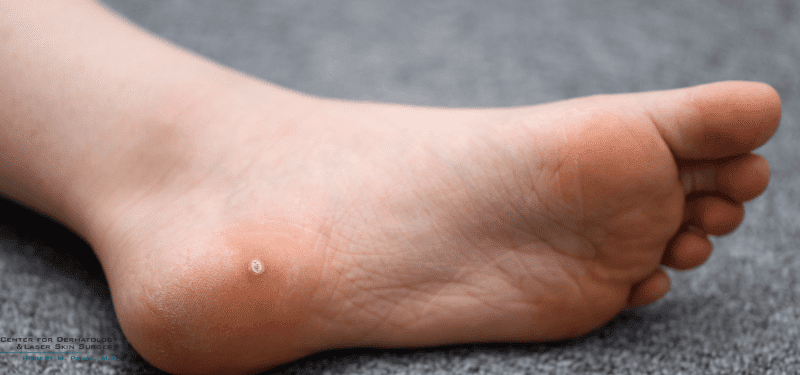If you’ve ever had a plantar wart – a wart on the sole of your foot – you know well the discomfort it causes. For everyone else: Imagine a small rock stuck in one of your sneakers, and you’re unable to stop and remove it.
Warts are small, noncancerous growths that can crop up just about anywhere on the body. However, plantar warts develop only on the soles of the feet. They form small, round, rough, and often flat growths on the skin, with tiny blood clots in the center that can look like black dots.
Plantar warts are common, and there are a number of treatment options available. But they can be stubborn, sometimes taking months to go away. Here’s what you should know about treating them.

What causes plantar warts?
Every kind of wart is caused by the human papillomavirus (HPV), which can live on various surfaces, especially those around public pools, gyms, and locker-room showers. If you walk around barefoot with any sort of opening in the skin, you’re exposing yourself to the virus, and a plantar wart could develop.
Once one forms, standing or walking can put pressure on the wart, forcing it to grow inward – in contrast to warts on other parts of the body, which grow outward and form small bumps.
After someone is exposed to HPV, it can take several weeks or even a few months to develop a plantar wart. And while they can appear at any time of year, there tends to be a surge in the fall, just after the barrage of summer’s barefoot activities.
Plantar warts are contagious. They can spread via skin-to-skin contact or from sharing shoes. It’s also possible for the virus to spread to nearby parts of your skin and form “satellite lesions.”
Anyone can get a plantar wart, but they’re more common in children and teens, who are more likely to be in close contact with others while playing sports or at school. People who have a history of having warts or who have a weakened immune system may also be more susceptible.
Can you treat a plantar wart at home?
Because plantar warts can take years to go away on their own, and because they can be painful and get bigger over time, people usually opt to remove them.
An assortment of over-the-counter liquids, gels, and pads made with salicylic acid are available to treat plantar warts at home. However, they’re not always effective. That’s because they’re used incorrectly or they may not contain a high enough acid concentration.
A board-certified dermatologist can “paint” the wart with cantharidin, a topical medication. It causes a blister to form that blocks the wart’s blood supply. About a week later, the dermatologist will shave the outer layer of skin and remove some of wart tissue. More than one appointment may be needed to get rid of the wart completely.
Cryotherapy is another option, but this technique can be painful when it’s used on the bottom of the foot. It’s also usually not as effective as cantharidin.
For warts that don’t respond to other methods, laser treatments with local anesthetics may be used. Sometimes, plantar warts are surgically removed, too.

Can plantar warts be prevented?
The best strategy for preventing plantar warts is limiting the time you spend walking around public places barefoot. Wear flip-flops in public showers and around pool decks, and keep your feet moisturized to prevent cracks.
The HPV vaccine doesn’t specifically target the strains of the virus that cause plantar warts. That said, some limited evidence suggests the vaccine might help plantar warts, as well as other types of warts, clear up more quickly. So, if you’re eligible for the vaccine, consider getting it.



 Everything You Need to Know About Atopic Dermatitis
Everything You Need to Know About Atopic Dermatitis